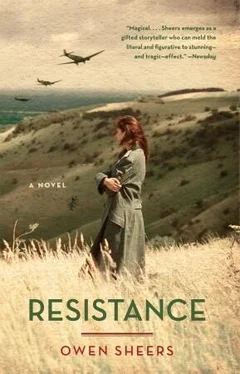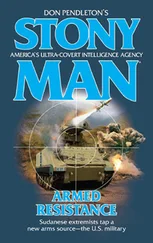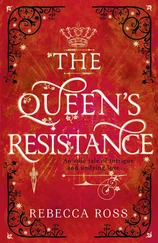The rest was already history. The Panzer divisions and the infantry reinforcements were released from their positions in Calais and were waiting in Normandy on that overcast morning when a choppy, truculent sea offered up so many men to the slaughter. The thought that one man might have made this possible and everything that had happened since, even his own situation, huddled under a ledge on a barren winter hillside, a pair of headphones clamped to his ears, both numbed and excited Albrecht to the core.
The excursions to higher ground were not just an opportunity for Albrecht to furnish himself with as much information as possible. They were also a chance for him to try and get closer to Steiner, to tune in to the younger soldier’s emotional frequency just as he tuned in to the voices of the airwaves. Steiner was the only direct witness of Albrecht’s reluctance to make contact with any of the surrounding command units. He was also the one member of the patrol who Albrecht anticipated would be most resistant to his plans. Steiner was more serious than Gernot and less damaged than Otto. Unlike Sebald and Alex he’d seen relatively little fighting. The death of his sister in a British air raid, meanwhile, still burned within him and he had not, as yet, been in the war for long enough to have his enthusiasm for the causes of National Socialism blunted. Out of all of them Steiner had the least to lose from rejoining the war, and it was this that worried Albrecht. As such, Albrecht was aware he needed a more intimate bond with the boy, so as to better prepare the ground for when the subsiding winter meant he’d have to reveal his intentions to the rest of the patrol. So when they weren’t listening to the radio, Albrecht encouraged Steiner to talk instead. At first he was hesitant, unused to such informality with a commanding officer. But he soon opened up, telling Albrecht more about his family in Hamburg. Both his parents were teachers, his father of maths, his mother of French. He showed Albrecht photographs of them, drawing them, curled and weatherbeaten, from his wallet. One was of the whole family in a garden. Steiner was there, his young man’s face just traceable under the last years of his boyhood puppy fat. His sisters flanked him, Hilda with dark hair and Margaret with blond. His mother stood behind them, a hand on each of her daughters’ shoulders. All three children wore the uniform of the Hitler Youth.
As the radio reports became more optimistic, as London fell to both the winter and the German advance, Steiner began to speak more of his plans for after the war. He wanted to go to university and study sound engineering. And then he wanted to work in film. That was the future of sound, he told Albrecht, blowing into his gloved hands to warm his fingers, film sound. After the war he would travel the world with a film unit, sending their newsreels and films, all with detailed, intricate sound tracks, back to Germany from the far reaches of the Empire of the Third Reich.
In return, although Albrecht said nothing of his future, he did share glimpses of his past. He told Steiner about his time at university studying medieval history and literature; how he had come to Oxford before the war to study for a doctorate and even about the subject of his thesis, the thirteenth-century Ebstorf World Map, destroyed just last year in an air raid. His mention of the air raid was purposeful, leading Steiner on to speak again of his killed sister. Albrecht listened and then shared his own stories of loss, telling Steiner how in one night both his parents and his fiancée, Ebbe, had been killed in the same raid over Dresden just months before the renewed Luftwaffe fought back the British bombers.
Albrecht had lost his only photograph of Ebbe somewhere on the Russian Front, so he described her to Steiner instead, recalling her delicate bones, “like the hollow bones of a bird,” her sallow skin, her jet black hair cut short in the modern style. Closing his eyes he even described the curious half-twist of her smiling lips that had so caught his attention in the lecture hall at the beginning of his first year. Her name, he told Steiner, came from Old German. It meant the returning of the tide. And that is what he’d written to her in his last letter. That like her name, one day he would return to her. That after ebbing away on the retreating current of the war for so long, he would return, rushing back to her like the sudden tides of the flat Friesian coast they’d once run away from, holding hands on a summer’s day before the war. But he had not. He had not returned and she had died without him, burnt alive by a British incendiary bomb.
Having Steiner close at hand also meant Albrecht was able to dampen the boy’s enthusiasm in response to the increasingly triumphal German broadcasts. By retuning the radio to the faint transmission of the BBC, he could counter the German claims with the British reports, well known among German soldiers to have a history of being closer to the truth. Albrecht still remembered when it was pointed out to him, early in the war, that the Nazis’ massive tallies of sunk Allied shipping actually outstripped all the ships ever built in the world. Nodding his head grimly throughout the BBC reports, he’d translate for Steiner, carefully undermining the previous German transmission, allowing them some degree of credibility but always leaving the picture several shades bleaker than at first painted. Again he was thankful no one else in the patrol spoke English.
“That’s it!” Steiner had exclaimed when they heard the report of Hitler’s visit to Parliament Hill in London. “It’s over. We’ve won. The war’s over.”
“No,” Albrecht had said, placing a hand on his shoulder. “Not quite. They haven’t said that yet. There’s been no surrender. London has fallen, that’s good, but it isn’t over yet.” Steiner had looked at him, failing to understand his pessimism. He knew that older soldiers like Albrecht had been waiting for this day for years. “Soon though,” Albrecht had continued, giving Steiner’s shoulder a tap. “Soon, for sure.”
What Albrecht said was true. There had been no official British surrender. There was still fighting in the Far East and new unrest in Russia. America was, in theory, still in the war, although now impossibly stretched on all fronts and under siege from a growing band of reinvigorated isolationists at home. The Führer’s visit to London was strange too. Why no description of Wehrmacht divisions marching up the Mall? Hitler addressing the world from outside Number 10 Downing Street? Could it be that only certain areas of the city could be guaranteed as safe? That the lightning visit was, in fact, a desperate measure in an ongoing war of propaganda? But Steiner was also right. The war would, officially at least, soon be over, and what would Albrecht do then?
In the end both the thawing of the winter and Sebald’s intuition of Albrecht’s intentions forced his hand. Towards the middle of February they woke to the sound of dripping water. The temperature had risen above freezing for the first time in months and the icicles outside their windows were melting. It was like waking from a long dream. For the past three months all of them had settled into the winter and The Court. Alex had thrived, the contact with animals and with Maggie reviving a part of him long numbed by the war. Gernot, meanwhile, had proved ever more resourceful and inventive in the kitchen. Both he and Steiner had asked Albrecht for some English instruction, which Albrecht had given them. Their interest was, no doubt, fuelled by their chaste glimpses of Bethan, which always provoked a bout of friendly rivalry and banter between the two younger soldiers. Albrecht was more than happy to encourage their distant admiration of the farm girl, especially in Gernot, in whom he’d recognised a growing infatuation with Bethan beyond a young man’s bravado. Otto had begun to speak again.
Читать дальше












